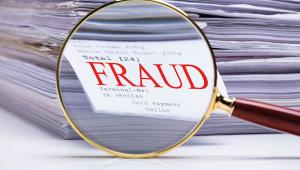Keeping one step ahead of fraudsters is a challenge for the public sector at the best of times. In today’s changing environment, this is even more difficult.
The recent launch of the Department of Work and Pensions’ Single Fraud Investigations Service (SFIS) was good news for the fight against benefits fraud. But the wholesale transfer of proven counter fraud capability to SFIS creates a skills gap in local authorities, just as the risk of fraud in town halls is growing. Budget cuts are also having an impact across the board; tackling fraud, often seen as a back-office function, is not always a priority when trying to protect frontline services that are more visible to the public.
But these challenges must not stop organisations, whether charities or government departments, from striving to create an anti-fraud culture, where there is a ‘tone from the top’ that fraud and corruption is not tolerated, where counter fraud activity is embedded into day-to-day running of the organisation and where, perhaps most importantly, counter fraud staff have the right skills and are fully empowered to tackle fraud.
Thankfully, there exists a counter fraud profession with a fully accredited qualification pathway that gives staff responsible for countering fraud and corruption, including investigators, managers and supervisors, and internal audit staff, as well as those who are in a position to detect fraud at an early stage, the essential skills and knowledge they need.
There are two entry-level qualifications aimed at those on the ground – the Accredited Counter Fraud Specialist (ACFS) and the Accredited Counter Fraud Technician (ACFT). The ACFS is aimed at full-time counter fraud practitioners and focuses on end-to-end management of investigations and the creation of an anti-fraud culture within organisations, while the ACFT focuses on general fraud awareness and how to support an investigation.
The core syllabus for both qualifications has been set by the Counter Fraud Professional Accreditation Board in conjunction with the University of Portsmouth’s Centre for Counter Fraud Studies. They aim to establish and maintain professional standards. They also carry higher education credits, which means that having achieved ACFS status, individuals have the opportunity to go on to become Certified Counter Fraud Specialists (CCFS) and Graduate Counter Fraud Specialists (GCFS).
This clear professional pathway highlights the particular skills needed to detect, prevent and recover fraud losses. It also points to the importance of creating a “common language” among counter fraud practitioners, where common and consistent levels of skills, knowledge, methodologies and best practice exist. When it comes to combating fraud, if everyone is speaking the same language, this makes life a lot more difficult for the fraudster.
The CIFPA Counter Fraud Centre, in helping central government, charities and local authorities to create their own anti-fraud cultures, offers both the ACFS and the ACFT qualifications. Successful delegates receive accreditation from the Counter Fraud Professional Accreditation Board and from CIPFA.
Here are 10 tips for creating an anti-fraud culture:
1 Set the tone at the top
Creating an anti-fraud culture is part of good governance and should start with a clear commitment to tackling fraud and corruption led by the executive board. Zero tolerance to fraud ideally forms part of an organisation’s ‘ethical mission statement’ or strategy document, reinforcing expected standards in public service. Having qualified counter fraud specialists in place can help to achieve this, as they have the credibility, standing and expertise to raise the profile of the anti-fraud agenda internally.
2 Know and prioritise your fraud risks
Knowing what the fraud and corruption risks are determines the type of framework you need to put in place and how your staff work within it. For example, if your risks include procurement fraud, those responsible for procuring contracts and services need to recognise fraud, bribery and corruption indicators when they see them. Qualified counter fraud specialists ease this process as they can assess risk and train support staff in appropriate action.
3 Scan the horizon
Fraud is constantly changing and scams often target frontline staff. What seems low risk today may turn into high risk in the future. From impersonation to phishing, cyber fraud to mandate fraud, it is vital that your organisation is up-to-date on the latest threats and risks and how to tackle them. Qualified counter fraud specialists can ensure that staff know where to go if they suspect something but are also plugged into networks of other specialists, which are vital sources of information and alerts.
4 Build fraud awareness
Creating an anti-fraud culture and beating fraud is everyone’s business, from the dedicated counter fraud specialists through to the procurement team, HR, facilities staff and beyond. A qualified counter fraud specialist will be fully trained in how to help mobilise the entire organisation in the fight against fraud. Whether using e-learning, staff briefings, posters or internal alerts – or a combination of all these – they will be best placed to define and execute awareness programmes that best suit your organisation.
5 Ensure policies and procedures are in order
Counter fraud specialists are expert at both finding the gaps in existing policies and procedures and in defining what counter fraud policies are needed, based on the size and nature of your organisation. For example, a general fraud policy should include guidelines on what to do when suspicions of fraud arise, a response plan, details of gift and hospitality registers and, where appropriate, mandatory declarations of interest. A visible and well-articulated whistleblowing policy is also essential for creating an anti-fraud culture.
6 Create a dedicated anti-fraud team
Your counter fraud specialists would ideally function independently from other teams. This is to ensure their objectivity and unfettered access to the information and resources they need. This includes access to specialist services, including forensic support and confidential and secure resources for keeping evidence.
7 Take action
Getting your money back so it can be spent on key services is obviously vital. Qualified counter fraud specialists are fully trained in how to conduct investigations, how to pursue a case to court and how to prepare a case for passing to the CPS, solicitors or police. In addition, they have the ability to give evidence in court and also to undertake proceedings using the Proceeds of Crime Act.
8 Measure success
Today’s counter fraud specialists not only understand how to detect, prevent and recover fraud losses, they are also trained to measure and report on the effectiveness of the preventive measures they put in place. This forms a key part of an organisation’s anti-fraud culture as it highlights to senior management the success of counter fraud work, the money saved and where vulnerable areas exist in the organisation.
9 Publicise your success
Sharing the outcome of a successful investigation or how an anti-fraud measure has worked is a great way to send a message that fraud doesn’t pay. Qualified counter fraud specialists understand this and will want to publicise their success both internally and externally. As well as being a deterrent, this can also lead to an increase in referrals and whistleblowing, which are indicators that your anti-fraud culture is working.
10 Never take your eye off the ball
Fraud is an evolving threat and as fraud risk doesn’t stand still nor should your organisation’s strategy to combat it. Qualified counter fraud specialists are trained to implement and manage programmes to regularly monitor the measurement and control strategies in place, making any necessary adjustments as they go. They will also be able to recognise circumstances when refresher training may be needed and when a new threat demands action.




















